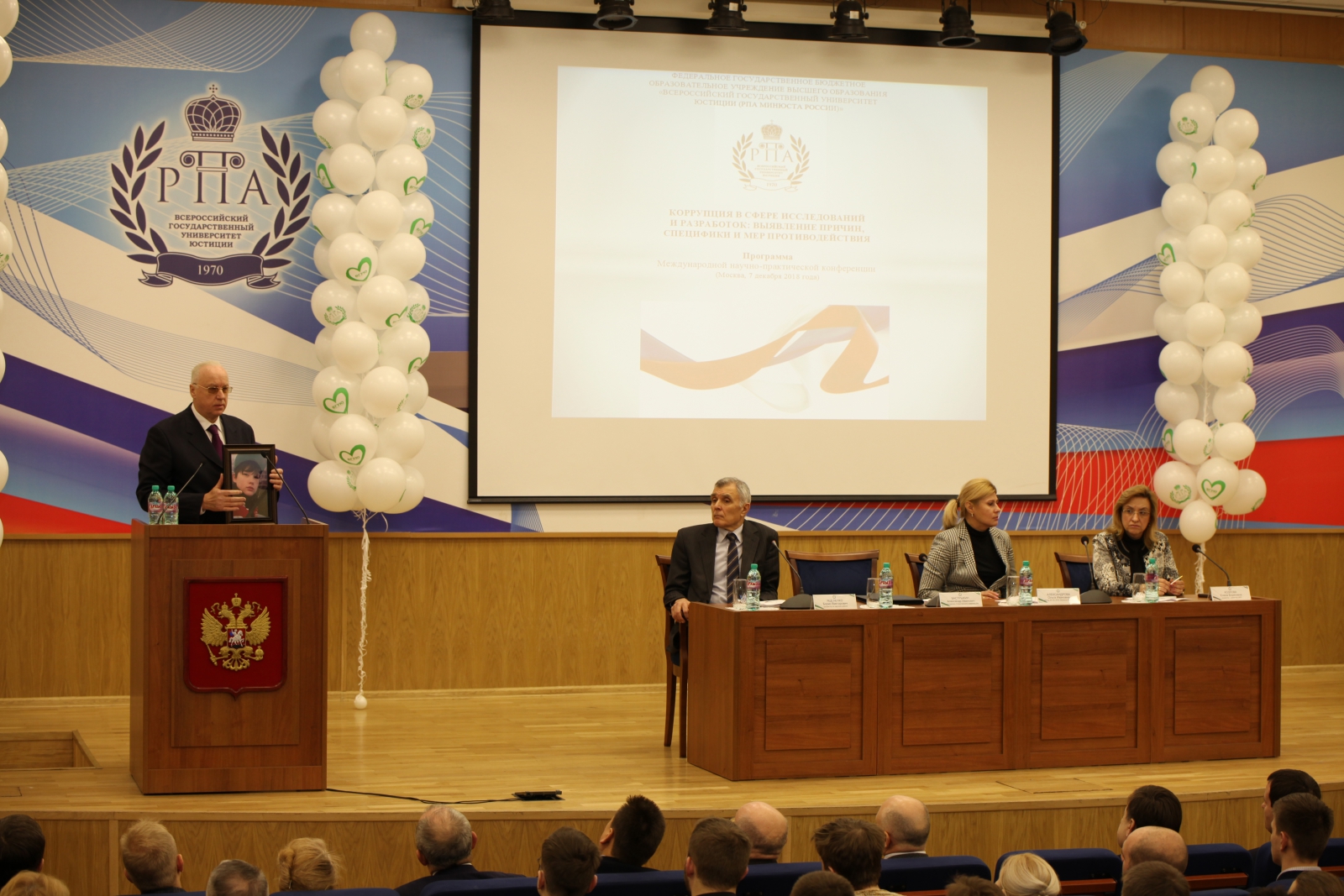
Address of the reception office of the Investigative Committee: Moscow, ul. Pervaya Frunzenskaya, d 3a
Address for writtent applications: 105005, Moscow, Tekhnichesky Pereulok, 2
Address of the reception office of the Investigative Committee: Moscow, ul. Pervaya Frunzenskaya, d 3a
Address for writtent applications: 105005, Moscow, Tekhnichesky Pereulok, 2

The Chairman of the Investigative Committee of the Russian Federation took part in an international scientific and practical conference “Research and Development Corruption Issues: Identification of Causes, Specific Nature and Countermeasures” that took place in the Russian State University of Justice. The plenary session was also attended by representatives of the judicial system, prominent scientists and professors from leading Russian universities.
Before proceeding to the subject of his speech, the Chairman of the Investigative Committee reminded the public about a recent tragedy - the death of Vanya Krapivin after his long struggle for life. Alexander Bastrykin noted that the little hero was posthumously awarded with the medal “Valour and Courage” of the Investigative Committee of Russia and that the Committee also intends to make a recommendation to the country’s leaders to award Vanya posthumously with a state award. The Chairman of the Investigative Committee of Russia initiated a minute of silence to be observed in the memory of Vanya.
Speaking on the conference’s subject, Alexander Bastrykin underlined that “the President of the Russian Federation noted that the government allocates enormous funds for combating corruption and it’s obvious for us, law enforcement officers that the tendency towards increasing corruption is caused by the fact that we are becoming rich - economics is on the rise and budget grows as well.”
The Chairman emphasised that the clear achievement of recent years is an accurate legal framework for combating corruption built by joint effort, which includes the National Strategy for Combating Corruption, the Strategy of National Security of the Russian Federation, the Strategy of Economic Security of the Russian Federation up to 2030 approved by Presidential Decrees, as well as the Concept for Public Security and other instruments.
“Combating corruption is gaining momentum,” the Chairman of the Investigative Committee of Russia stated and provided statistics data reflecting the activities of the Committee in this area. For instance, the Investigative Committee has obtained significant experience of investigation of crimes involving corruption and has referred to court over 71,000 probes, including 453 probes into organised groups and criminal communities involved in corruption, since 2011. “Please pay attention to the fact that corruption trends are actively developing and now corruption does not only involve the relationship between two parties - criminal organisations and communities are emerging in this field,” the Chairman underlined and gave the example of a probe into Vyacheslav Gaizer.
Alexander Bastrykin also noted that, during the stated period, the Committee completed over 11,600 investigations into corruption involving swindling; almost 25,000 of the investigations involved bribe-giving, around 12,000 bribe-taking, 3,500 abuse of authority, almost 3,000 forgery, and almost 2,500 exceeding official powers and commercial bribery. Approximately 78,000 persons have been accused of committing 116,000 of such offenses in total. Analysing the obtained experience, the Chairman of the Investigative Committee of Russia highlighted that it is necessary to bring up new psychological principles of authorities.
Moreover, Alexander Bastrykin listed areas that have the greatest exposure to corruption: law enforcement - over 55,000 offenses; science and education - over 27,000 offenses; social security and healthcare - over 19,000 offenses; financial activities - around 11,000 offenses.
“The Investigative Committee data show that the damage from corruption crimes has exceeded 123 billion roubles since 2011,” noted the Chairman of the Investigative Committee and stressed that the Committee implements the policy of arresting of the defendants’ property and promotes full confiscation for further reimbursement of the damage to assets.
Having voiced most popular swindling schemes during research and development and academic tasks, the Chairman appealed to the investigative practice to provide examples of measures for stricter supervision in science and education from the state and relevant anti-corruption authorities. Among those is an assessment of the required expertise of agents - science workers engaged in science and engineering activities; of the relevance of research and practical significance of its results, et cetera.
In conclusion of his report, Alexander Bastrykin thanked the organisers of the conference for a chance to speak and answered questions of the public related to countering corruption activities of the Committee.
During the conference, the participants discussed issues of qualification of corruption offenses, international experience of interaction between the state and society, issues of forming of anti-corruption legal awareness, and means of anti-corruption legislation improvement.